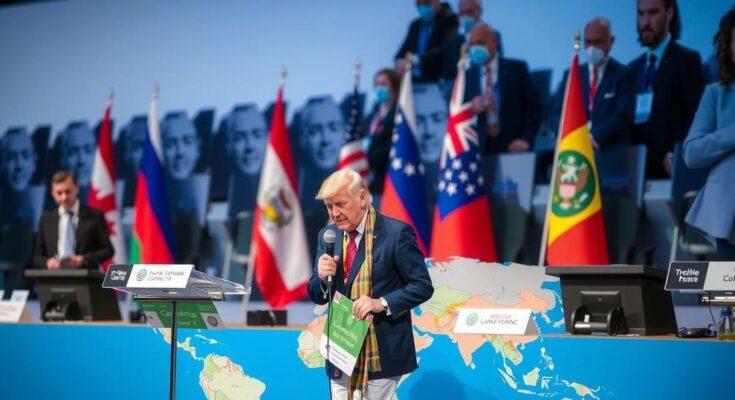COP29 concluded in Baku, Azerbaijan, highlighting the challenges of climate diplomacy amid rising populism and geopolitical tensions. The summit revealed limited progress on vital commitments despite an increasingly urgent climate crisis marked by devastating global events. Populist actions such as withdrawal from negotiations further marginalized developing nations, while geopolitical rivalries complicated cooperative efforts, demonstrating the fragility of international climate governance.
As COP29 concluded in Baku, Azerbaijan, its legacy was overshadowed by ineffective climate commitments and the rise of populism, which impeded global unity against a pressing climate crisis. Instead of being a platform for consensus, the summit emerged as a reflection of geopolitical tensions and a testament to the fragility of international cooperation in climate diplomacy. This summit occurred at a critical moment as the planet approaches the 1.5°C warming threshold amid unprecedented climate disasters globally.
Significant climate events in 2023, such as severe droughts in East Africa and extreme heat waves in India, demanded urgent action at COP29. However, the summit yielded limited progress, revealing the challenges faced in achieving meaningful climate advancements in an increasingly divided global political landscape. Populism has notably had a detrimental impact on climate diplomacy, with figures like Donald Trump, who has indicated a potential retreat from the Paris Agreement, posing major setbacks for international climate governance.
Additionally, the recent withdrawal of Argentina from the negotiations under President Javier Milei, who disparages climate change as a “socialist lie,” further illustrated the challenges faced by delegations advocating for climate action. The notable absence of pivotal leaders, such as Emmanuel Macron and Olaf Scholz, represented a troubling leadership void, leaving developing nations feeling increasingly marginalized during discussions about climate justice and financing.
The geopolitical landscape also severely complicated climate negotiations, as evidenced by tensions between Azerbaijan and France, along with the ongoing rivalry between the United States and China. This diplomatic strife hindered progress on the New Collective Quantified Goal (NCQG) for climate finance and aggravated frustrations among developing nations, who feel sidelined by the failure of wealthier nations to fulfill their financial pledges.
Despite these overwhelming obstacles, COP29 did see some positive developments. Countries committed to tripling climate finance for developing nations, with a pledge of “at least” $300 billion per year by 2035. Some leaders, despite their right-wing affiliations, emerged as unexpected advocates for climate initiatives, highlighting potential areas for continued progress.
However, the modest gains at COP29 are overshadowed by the inadequacy of the NCQG and the larger amount of funding critically needed to fight climate change, especially as vulnerable nations face existential threats from climate impacts. The aftermath of this summit highlights an urgent need for a reevaluation of global climate governance, emphasizing accountability and collaboration among nations to salvage a more effective climate diplomacy moving forward. As attendees prepare for COP30 in Brazil, the challenges remain significant, yet the potential for transformative change endures in the face of rising populism.
The COP29 summit, hosted in Baku, Azerbaijan, unfolded against the backdrop of a waning global consensus on climate action, reflecting the increasing encroachment of populism and geopolitical rivalries. With the world nearing a critical warming threshold, the urgency of addressing climate change became more pronounced, yet the summit highlighted stark limitations in commitments and progress. Populist sentiments led to notable withdrawals from negotiations and diminished representation for developing nations, exacerbating tensions over climate finance and justice. The geopolitical landscape also positioned COP29 as a litmus test for international cooperation amidst heightened competition between global powers, showcasing a significant leadership vacuum with far-reaching implications for future climate initiatives.
In conclusion, COP29 poignantly illustrated the deteriorating state of international climate diplomacy amid growing populist sentiments and geopolitical disputes. While some commitments were made, they fell short of rectifying the inadequacies exposed during the conference. Moving forward, a concerted effort is necessary to rejuvenate global climate governance, emphasizing collaborative approaches to climate finance and accountability if meaningful progress is to be achieved in the face of escalating climate challenges. The upcoming COP30 in Brazil presents an opportunity for nations to transform their strategies and priorities in an era marked by fragmentation and urgency.
Original Source: m.thewire.in




